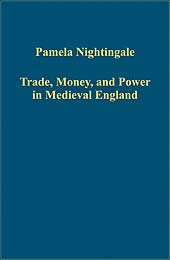Trade, Money, and Power in Medieval England Variorum Collected Studies Series
Auteur : Nightingale Pamela

Contents: Introduction; Communication through capital and trade: money and the rise of a market economy in medieval Europe; The ora, the mark, and the mancus: weight-standards and the coinage in 11th-century England (parts 1 & 2); The evolution of weight standards and the creation of new monetary and commercial links in Northern Europe from the 10th century to the 12th century; Some London moneyers, and reflections on the organisation of English Mints in the 11th and 12th centuries; The origin of the Court of Husting and Danish influence on London's development into a capital city; 'The king's profit': trends in English Mint and monetary policy in the 11th and 12th centuries; The London Pepperers' Guild and some 12th-century English trading links with Spain; The lay subsidies and the distribution of wealth in medieval England, 1275-1334; Norwich, London, and the regional integration of Norfolk's economy in the first half of the 14th century; The English parochial clergy as investors and creditors in the first half of the 14th century; Knights and merchants: trade, politics, and the gentry in late medieval England; The growth of London in the medieval English economy; Capitalists, crafts, and constitutional change in late 14th-century London; Money and credit in the economy of late medieval England; Monetary contraction and mercantile credit in later medieval England; England and the European depression of the mid-15th century; Index.
Date de parution : 11-2007
15.2x22.9 cm
Date de parution : 12-2018
15.6x23.4 cm
Thèmes de Trade, Money, and Power in Medieval England :
Mots-clés :
Capital; Trade; Weight-standards; Coinage; Northern Europe; English Mints; Danish Influence



